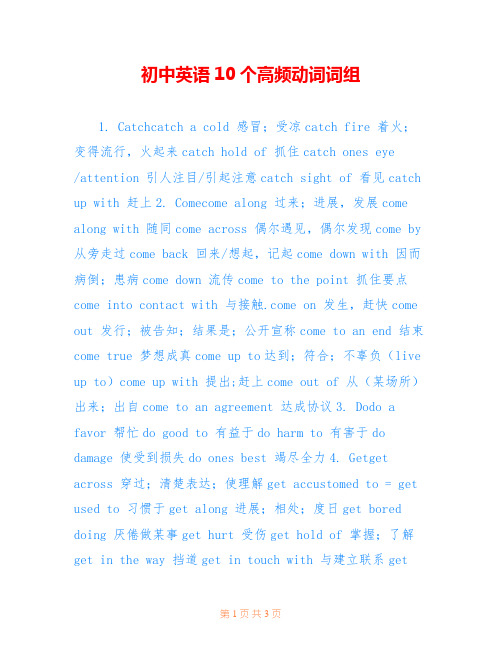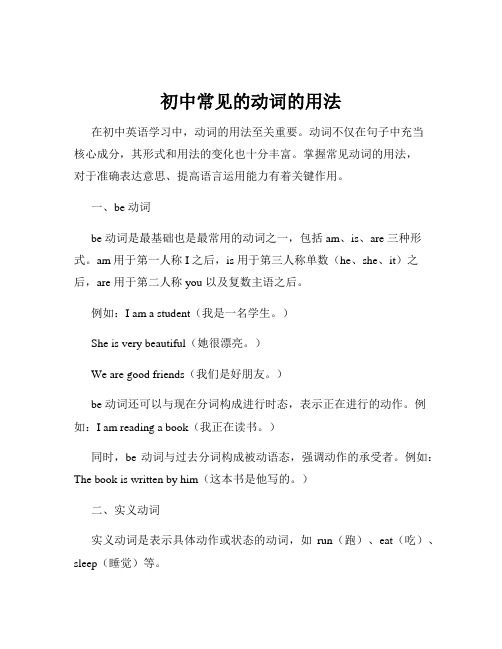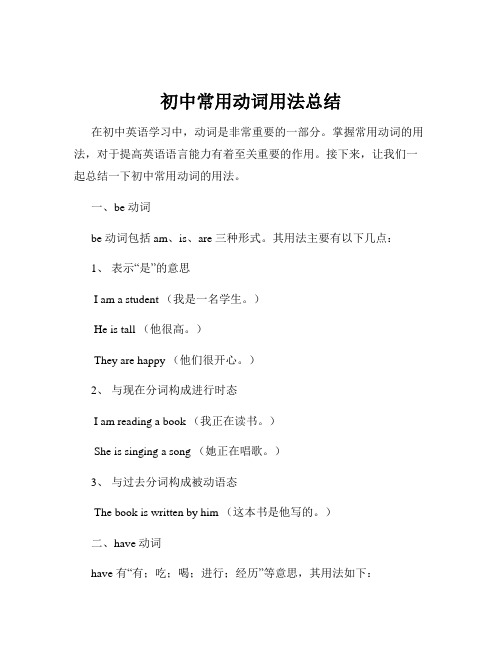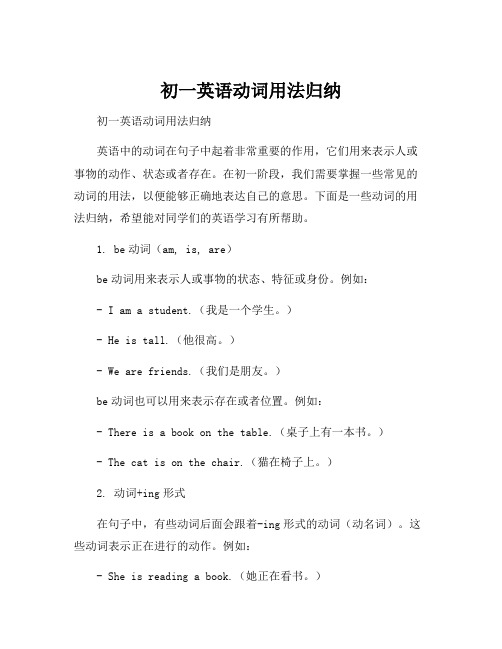初中英语高频动词用法汇总
初中英语10个高频动词词组

初中英语10个高频动词词组1. Catchcatch a cold 感冒;受凉catch fire 着火;变得流行,火起来catch hold of 抓住catch ones eye/attention 引人注目/引起注意catch sight of 看见catch up with 赶上2. Comecome along 过来;进展,发展come along with 随同come across 偶尔遇见,偶尔发现come by 从旁走过come back 回来/想起,记起come down with 因而病倒;患病come down 流传come to the point 抓住要点come into contact with 与接触.come on 发生,赶快come out 发行;被告知;结果是;公开宣称come to an end 结束come true 梦想成真come up to达到;符合;不辜负(live up to)come up with 提出;赶上come out of 从(某场所)出来;出自come to an agreement 达成协议3. Dodo a favor 帮忙do good to 有益于do harm to 有害于do damage 使受到损失do ones best 竭尽全力4. Getget across 穿过;清楚表达;使理解get accustomed to = get used to 习惯于get along 进展;相处;度日get bored doing 厌倦做某事get hurt 受伤get hold of 掌握;了解get in the way 挡道get in touch with 与建立联系getoff 下车get on 上车5. Gogo beyond 超出;胜过go back on 违背(诺言等)go Dutch 各付个的;AA制go in (into) 详细调查;从事go in for 赞成;参加(考试);热衷于go off 消失;变质;爆炸,发出响声go on with = go ahead 继续go out 出去;泄密;过时;停止运转,熄灭;约会go out of ones way to do sth.不辞辛苦做...go over 参观;复习;仔细检查;被接受(得到赞许);go through 通过;经历;完成go through with 把进行到底,完成,实现go all out 全力以赴;竭尽全力6. Keepkeep an eye on sth. 照看;密切注视keep in mind 记住keep in touch with 与保持联系keep off 避开keep back 隐瞒(信息),拒不告诉;保留,储存keep on (doing) 继续(做某事)keep ones finger crossed 祝好运keep up with 跟上;继续keep up ones spirits 振作精神keep cool 保持冷静keep sth. in mind 把记在心上keep sb. from doing sth 阻止某人做某事7. Makemake a night of it 痛快的玩一晚make a day of it 做了一整天make a living 谋生make a face 扮鬼脸make a point of 坚持要make do 凑合,将就make ends meet 收支平衡make friends 交朋友make for 有利于,有助于make it 成功make no difference 毫无区别make a difference 有影响,有关系8. Putput away 把放回原处;收起来put forward 提出put off 延期put on 穿上;上演put to use 使用put up举起;安顿;参与;建立put up with 容忍;忍受put out 熄灭;解雇;给添麻烦,冒犯9. Taketake action 采取行动take advantage of 利用take after 仿效;(相貌、脾气或性格)与相似,像take care of 照顾take effect 生效take charge of 负责;管理take into consideration 考虑到take it easy 不要紧张;慢慢来take measures = take steps 采取措施;步骤take off 起飞take ones time doing sth.从容不迫做某事take part in 参加take place 代替;发生,出现take turns 轮流take up占有;着手take a break 休息,放松take a close look at 仔细看一看10. Turnturn around 转身in turn 轮流地(反义)out of turnturn down 关小;拒绝turn in = hand in上交turn into 把变成turn off 关闭turn on 打开turn over 移交;再三考虑;翻转turn to 翻到;转向;求助于turn out 结果是;培养;生产;打扮。
初中英语动词用法(全)[1].
![初中英语动词用法(全)[1].](https://img.taocdn.com/s3/m/96811447fc4ffe473268ab46.png)
初中英语动词用法Aact v. 表演,演戏act as sb./ sth. 充任某角色,担任某工作I don’t understand English, so you have to act as my interpreter(翻译。
其他用法:act for 代表某人,代理某人的职位During her illness, her lawyer has been acting for her in her business.在她生病期间,她的律师一直代理她的业务。
add v. (1加,增加,添加add sth. to sth. 往...里添加... eg. If the tea is too strong, add some water to it. eg. He added his signature to the petition(请愿书。
add A and B (together 加eg. If you add 5 and 5, you get 10.add to sth. 增加某事物eg. The bad weather only add to our difficulties.这种坏天气更增加了我们的困难。
(2 补充;继续说eg. “I’ll come here later.’’ he added.add in 包括...在内eg. Don’t forget add me in. 别忘了把我算上。
add up 合计,加起来add up to 总计达到add fuel to the fire 火上浇油afford v. 负担得起(...的费用,损失,后果,买得起;抽得出时间(常与can, could, be able to 连用afford sth. eg. I’d love to go on holiday but I can’t afford the time.eg. They walked because the can’t afford a taxi.afford to do sth. eg. They walked because they can’t afford to take a taxi.eg. I have to work hard because I can’t afford to loose my job.agree v. 同意,赞同agree with sb. 同意某人的意见eg. I agree with you.agree on + 表示具体协议的文件、计划、行动的词eg. We agreed on the plan. agree to do sth. 同意做某事eg. We agreed to start early.agree that + 宾语从句eg. She agreed that I was right.其他用法:agree with sb. (尤用于否定或疑问句 (对某人的健康或胃口适合I like mush rooms but unfortunately they don’t agree with me.我喜欢吃蘑菇,可惜吃了以后难受。
初中英语7-9年级阅读理解高频动词短语汇总(附练习题)

初中英语7-9年级阅读理解高频动词短语汇总(附练习题)同一动词+不同介词/副词come 短语come across (偶然)遇见(或发现)come along (意外地)出现;发生;来到come down 降落come from 来自come back 回来come on 快点;加油come out 出版;发表;开花;发芽come over 顺便来访come true (希望、梦想等)实现get 短语get away 逃离get back 返回get down 下降get on 上车get off 下车get over 克服get up 起床;起来get along/on with sb. 与某人相处go 短语go away 走开;离开go back 回去go up 上升;增长go out 出去;熄灭go off 爆炸;走开;衰退go over 仔细检查;复习go through 通过give 短语give away 赠送;分发give back 还给;归还;恢复(健康等)give in 投降,屈服give out 发出(气味、光线、声音、信号);分发give up 放弃look 短语look after 照顾;照看look at 看look around 环顾四周look for 寻找;寻求look into 调查look out 当心look over (仔细)检查look through 浏览look up (在词典、参考书等中)查阅;查找look up to 钦佩;仰慕;尊敬look down upon 瞧不起look forward to 盼望;期待put 短语put away 把……收起来;储存……备用put down 写下;放下put off 推迟;拖延put on 穿上;上演;增加put out 扑灭;熄灭(火)put up 张贴;搭建take 短语take away 拿走;带走take down 取下;记下;拆卸take in 吸入;吞入(体内)take out 取出take off 脱下(衣服);(飞机等)起飞take up 占据(时间、空间);开始从事;拿起take care 当心;小心take after (在外貌、性格等方面)与(父母等)相像take care of 照看;照顾turn 短语turn down 调低,调小;拒绝turn up 开大, 调高;出现turn on 打开turn off 关闭turn out 结果是turn in 上交练习题 11.We will never our dream until it comes true one day.A.give upB.give inC.give outD.give away【解析】句意:我们永远不会我们的梦想直到它实现的那一天。
初中英语常用的动词用法

初中英语常用的动词用法初中英语常用动词用法:1. allow sb. to do sth. 允许某人去做某事My father allowed me to go out for a walk after finishing my homework.2. asked sb. (not) to do sth. 叫某人做事某事(叫某人不要去做某事)My father asked me to study hard.He asked me not to swim alone.be asked to do sth. 被叫去做某事/被邀请去做某事I was asked to have a dinner with them yesterday.3. be afraid to do sth. 害怕做某事She is afraid to ask me questions.4. be afraid of doing sth. 害怕做某事I am afraid of going out at night.5. be afraid of sth. 害怕某物He is afraid of snakes.6. be amazed to do sth. 对做某事感到惊讶He was amazed to meet the girl there.be amazed at sth. 对某事感到惊讶they were amazed at the news7. be busy doing/with sth. 忙于做某事 (常考)e.g: I was busy washing my car at that time. 那时候我正忙于清洗我的车子。
I am busy with my work.8. be ing/going/leaving/flying/moving/dying(某些位移动词用进行时态时表将来)the bus is ing/the dog is dying.9. be excited to do sth. 对做……感到兴奋Jacky was excited to travel there by plane.be excited at sth.Lily was excited at his words.be excited about doing sth.he was excited about passing the exam without going overing books.10. be frightened to do sth. 害怕去做某事Sam is frightened to ride a horse.11. be glad/happy to do sth. 高兴去做某事she is happy to clean the blackboard with me.be pleased to do sth. 高兴做某事she was pleased to help the old man yesterdaybe pleased with sth. 对某事感到高兴/满意the teacher was pleased with my answer.12. be interested in sth./doing sth. 对某事感兴趣/对做某事感兴趣she is interested in swimming in the river.My brother is interested in Chinese.13. be/get ready for/to do sth.Be ready for sth. 为某事做好了准备We are ready for the exam.Be ready to do sth. 为做某事做好了准备We are ready to have a birthday party for her.get ready for sth.为某事在做准备We are getting ready for the exam.13. be sorry to do sth. 对做某事感到抱歉14. be surprised to do sth. 对做某事感到惊奇be surprised at sth. 对某事感到惊奇15. be worth doing sth. 值得做某事 (worth 后接动词-ing 形式,常考)16. begin to do sth.begin/start to do/doing sth.17. can/be able to afford (to buy) sth. 有能力购买(供)……18. can/may/must do sth. could/would/should/might do sth.19. can't wait to do sth. 迫不急待地去做某事20. decide to do sth. 决定去做某事make up one's mind to do sth. 下决心去做某事 (常考)make a decision to do sth. 对做某事作出决定21. deserve to do sth. 值得/应该做……22. encourage sb. to do sth.鼓励某人去做某事23. enjoy doing sth. 乐意去做某事24. expect (sb.) to do sth. 期望去做某事25. fail to do sth. 做某事失败succeed doing sth. 成功做了某事26. finish doing sth. 做完某事(后接动词-ing形式) (常考)27. follow sb to do sth. 跟随某人去做某事28. get sb. to do sth.make sb. do sth.let sb. do sth.29. get/have a chance to do sth.得到一个做某事的机会30. give/pass/show/lend/sell sb. sth./ sth. tosb.buy/get/bring sb. sth. / sth. for sb.31. go on to do sth. 继续做事(常考)go on doing sth. 继续做事(常考)32. hate to do/doing sth. 讨厌/不喜欢做某事33. have fun doing sth.34. have problems doing sth.做某事遇到困难35. have sb. do sth.have sth. donehave sth. to do 有事要做36. hear sb. do sth. 听到某人做某事(后接动词原形,常考)hear sb. doing sth. 听到某人正在做某事(常见)37. help to do sth. 帮忙做某事help sb. (to) do sth.帮助某人做某事38. hope/wish to do sth. 希望做某事wish sb. to do sth. 希望某人做某事39. I t seems that 这像是……(后接从句)seem to dosth.seem +adj.40. It's + adj.+(for sb.) to do sth.It's + adj. +(of sb.) to do sthe.g: It's glad for him to hear the news.41. It takes sb. some time/money to do sth. 花费某人多长时间做某事(常考)42. pay …for…costspend…on…..it take …to do sth.43. It's best for sb to do sth.. 对某人来说做某事是最好的had better do sth. 最好做某事 (注意had没有时态和人称的变化,better后接动词原形)44. It's time for sb. to do sth. 是某人做某事的时候了45. keep (on)doing sth. 坚持做某事(常考)keep sb. doing sth. 让某人做某事(常考)keep sb. from doing sth. 阻止某人做某事(常考)keep sb./ sth. +adj.keep the book for 2 days 借这本书两天(不要用borrow或lend)46. learn to do sth. 学做某事learn sth. from sb. 向某人学习47. like to do/doing sth. 喜欢做某事like sb. to do sth. 喜欢某人做某事48. need to do sth.need doing sth./to be doneneedsth .needn't do sth.49. prefer to do sth. rather than do sth. 宁愿……而不愿……(常考)prefer doing sth. to doing sth. 喜欢做……胜过做……e.g: I prefer reading books to going shopping. 比起购物来,我更爱读书。
初中常见的动词的用法

初中常见的动词的用法在初中英语学习中,动词的用法至关重要。
动词不仅在句子中充当核心成分,其形式和用法的变化也十分丰富。
掌握常见动词的用法,对于准确表达意思、提高语言运用能力有着关键作用。
一、be 动词be 动词是最基础也是最常用的动词之一,包括 am、is、are 三种形式。
am 用于第一人称 I 之后,is 用于第三人称单数(he、she、it)之后,are 用于第二人称 you 以及复数主语之后。
例如:I am a student(我是一名学生。
)She is very beautiful(她很漂亮。
)We are good friends(我们是好朋友。
)be 动词还可以与现在分词构成进行时态,表示正在进行的动作。
例如:I am reading a book(我正在读书。
)同时,be 动词与过去分词构成被动语态,强调动作的承受者。
例如:The book is written by him(这本书是他写的。
)二、实义动词实义动词是表示具体动作或状态的动词,如run(跑)、eat(吃)、sleep(睡觉)等。
1、及物动词与不及物动词及物动词后面必须接宾语,才能完整表达意思。
例如:I eat an apple(我吃一个苹果。
)“eat”是及物动词,“apple”是宾语。
不及物动词后面不需要接宾语就能表达完整的意思。
例如:Heruns fast(他跑得很快。
)“run”是不及物动词。
2、动词的时态一般现在时:表示经常发生的动作或存在的状态。
主语是第三人称单数时,动词要加“s”或“es”。
例如:He studies hard(他学习努力。
)一般过去时:表示过去发生的动作或存在的状态。
动词通常变为过去式,规则动词加“ed”,不规则动词有特殊的变化形式。
例如:I played basketball yesterday(我昨天打篮球了。
)现在进行时:表示正在进行的动作,由“be 动词+现在分词”构成。
例如:They are playing football now(他们现在正在踢足球。
(版)初中英语常见动词短语汇总及练习题(附解析)

初中英语高频考点之动词短语及习题(附解析) 一.同一动词+不同介词/副词break 短语breakin打断;闯入breakinto 破门而入breakout 爆发breakup打碎;结束;解散breakdown 发生故障;抛锚,分解breakaway脱离,放弃come短语comeup升起;发生comeupwith 想出〔主意〕comeacross(偶然)遇见(或发现)comealong进展;一起去comedown下降;下落comein进来comefrom来自comeback回来comeon赶快;加油comeout出版,发行;出现;开花;发芽comeover过来;顺便来访cometrue(希望、梦想等),成cut短cutup切碎cutdown 砍到,消减cutoff 切断,切除cutout 除;去;剪下cutin插嘴fall短fallinto 落入;陷入fallbehind 落后falldown 摔倒,倒塌falloff(从⋯⋯上)掉下fallasleep入睡fallover 倒;跌倒get短getaway逃离getback返回getdown下降geton上getoff下getover克服getup起床;起来getalong/onwithsb. 与某人相处go短语goaway走开;离开goback回去goup上升;增长goout出去;熄灭gooff〔闹钟〕发出响声goover仔细检查;复习gothrough通过give短语giveaway赠送;分发giveback还给;归还;恢复(健康等)givein投降,屈服giveout发出(气味、光线、声音、信号);分发giveup放弃jump短语jumpinto 跳入jumpover 跳过jumpoff 跳离leave短语leavefor出前往;身去leavebehind留下;留leaveout漏;省去;不考leavealone不打;不理look短lookafter 照;照看lookat看lookaround 四周lookfor找;求lookintolookout留神lookover(仔)lookthroughlookup(在典、参考等中);找lookupto佩;仰慕;尊敬lookdownupon瞧不起lookforwardto 盼望;期待put短putaway把⋯⋯收起来;存⋯⋯用putdown写下;放下putoff推;拖延puton穿上;上演;增加putout扑灭;熄灭(火);伸出putup张贴;搭建putback放回原处;把〔钟〕拨慢take短语takeaway拿走;带走takedown取下;记下;拆卸takein吸入;吞入(体内)takeout取出takeoff脱下〔衣服〕;〔飞机等〕起飞takeup占据(时间、空间);开始从事;拿起takecare留神;小心takeafter(在外貌、性格等方面)与(父母等)相像takecareof照看;照顾turn短语turndown调低;拒绝turnup 调高;出现turnon翻开;接通turnoff 关闭;切断turnout结果是turnin上交send短语sendout发出,发送,派遣sendup 发射sendfor 派人去请sendin寄去,递交二.不同动词+同一介词/副词about短语careabout关心;在意hearabout 〔=hearof〕听说talkabout谈论;讨论;thinkabout考虑;认为throwabout 乱丢;抛撒worryabout担忧at短语pointat 指向lookat看〔某人〕throwat 投向;掷向laughat(sb.)嘲笑〔某人〕knockat敲shoutat〔sb.)对〔某人〕大喊aimat瞄准;旨在away短getaway逃离giveaway送;分putaway把⋯⋯收起来;存⋯⋯用runaway逃跑;跑掉takeaway拿走throwaway扔掉moveaway搬走,移开back短bringback恢复;使想起;comeback回来getback回来;恢复giveback;送回goback回去talkback回嘴;嘴payback (借款等)down短breakdown 停止运;出故障calmdown保持冷静cutdown砍倒;削减falldown 落下;摔倒getdown下来;落下putdown 写下;下;放下shutdown 关上;停shootdown 射下,落takedown 撤除;turndown低;关小;拒writedown写下;下in短believein信任;信bringin引;生checkin到;登comein来handin交上;提交;呈送takein吸入;吞入(体内);理解;欺joinin 参加,参加of短hearof听thinkof 想起;;考getoutof 离开;从⋯⋯出来takecareof照;照看off短breakoff突然中止;中断cutoff切除;切断dropoff 减少;下降falloff从⋯⋯掉下getoff脱下;下gooff( )出响声;出〔光、等〕keepoff勿踏;勿knockoff停止做某事payoff清(欠款等)putoff推;拖延runoff 跑掉;迅速离开seeoff〔某人〕送行setoff身〔去某地〕;起程sendoff派遣shutoff关;停止运takeoff脱下〔衣服〕,〔机等〕起telloff ;分派turnoff 关on短puton穿上turnon翻开fighton持passonkeepon〔行〕tryon穿;看workon从事;忙于dependon依comeon赶快;加油;来吧holdon等一等〔挂〕out短blowout 吹breakout(争、火灾等)突然生;爆bringout 使;使表出checkout看;察cleanout去除;把⋯⋯打干clearout 清理;掉comeout出版;表cutout 除;去findout明;弄清getout出去,离开giveout出(气味、光、声音、信号);分goout出去;熄handout分发;发放hangout闲逛keepout不让......进入leaveout不包括;不提及;忽略lookout留神;留神putout扑灭;熄灭(火)pointout 指出runout 用尽;耗尽sellout卖完;售光setout出发;启程standout 站出来;突出;坚持到底takeout取出workout算出;解决help(sb.)out帮助(某人)解决困难over短语comeover过来;顺便来访fallover 绊倒;跌倒getover克服;恢复;原谅goover仔细检查;复习lookover(仔细)检查thinkover 仔细考虑up短bringup教育;培养;提出cheerup使振;使高起来(cheersb.up) cleanup(把⋯⋯)打干;(把⋯⋯)收拾整cutup切碎dressup穿上盛装;装扮eatup吃光;吃完fixup修理;修getup起床giveup放弃growup成;大hangup挂断hurryup赶快lookup(在典、参考等中);找makeup造;形成;成pickup起;接putup;搭建ringup打sendup射,把⋯⋯送上去setup建立;立;开showup出席;露面stayup不睡;熬夜takeup(尤指消遣)学着做;开始做thinkup想出turnup开大(声音);出useup用完;用光;耗尽wakeup醒来with短agreewith同;持相同意beginwith以⋯⋯开始connectwith与⋯⋯相dealwith理;付catchupwith 赶上comeupwith提出;想出(主意、答复等) getalong/onwithsb. 与某人相goonwithkeepintouchwithsb.与某人保持系keepupwith与......并;跟上习题及解析1.Wewillnever_______ourdreamuntilitcomestrueoneday.A.giveupB.giveinC.giveoutD.giveawayA【解析】句意:我们永远不会_ ____我们的梦想直到它实现的那一天。
初中常用动词用法总结

初中常用动词用法总结在初中英语学习中,动词是非常重要的一部分。
掌握常用动词的用法,对于提高英语语言能力有着至关重要的作用。
接下来,让我们一起总结一下初中常用动词的用法。
一、be 动词be 动词包括 am、is、are 三种形式。
其用法主要有以下几点:1、表示“是”的意思I am a student (我是一名学生。
)He is tall (他很高。
)They are happy (他们很开心。
)2、与现在分词构成进行时态I am reading a book (我正在读书。
)She is singing a song (她正在唱歌。
)3、与过去分词构成被动语态The book is written by him (这本书是他写的。
)二、have 动词have 有“有;吃;喝;进行;经历”等意思,其用法如下:1、表示“有”I have a pen (我有一支笔。
)They have many friends (他们有很多朋友。
)2、表示“吃;喝”Have some bread (吃点面包。
)Have a cup of tea (喝杯茶。
)3、与过去分词构成完成时态I have finished my homework (我已经完成了作业。
)三、do 动词do 用作实义动词时,表示“做;干”,用作助动词时,用于构成疑问句和否定句。
1、实义动词Do your homework (做你的作业。
)She does the dishes (她洗碗。
)2、助动词Do you like English? (你喜欢英语吗?)I don't know (我不知道。
)四、make 动词make 常见的意思有“制作;使;让”。
1、表示“制作”Make a cake (做一个蛋糕。
)2、表示“使;让”Make me happy (让我开心。
)五、take 动词take 有“拿;取;带走;花费”等意思。
1、表示“拿;取”Take this book (拿这本书。
初一英语动词用法归纳

初一英语动词用法归纳初一英语动词用法归纳英语中的动词在句子中起着非常重要的作用,它们用来表示人或事物的动作、状态或者存在。
在初一阶段,我们需要掌握一些常见的动词的用法,以便能够正确地表达自己的意思。
下面是一些动词的用法归纳,希望能对同学们的英语学习有所帮助。
1. be动词(am, is, are)be动词用来表示人或事物的状态、特征或身份。
例如:- I am a student.(我是一个学生。
)- He is tall.(他很高。
)- We are friends.(我们是朋友。
)be动词也可以用来表示存在或者位置。
例如:- There is a book on the table.(桌子上有一本书。
)- The cat is on the chair.(猫在椅子上。
)2. 动词+ing形式在句子中,有些动词后面会跟着-ing形式的动词(动名词)。
这些动词表示正在进行的动作。
例如:- She is reading a book.(她正在看书。
)- We are playing basketball.(我们正在打篮球。
)常见的动词+ing形式的用法还包括喜欢、爱好等。
例如:- I enjoy listening to music.(我喜欢听音乐。
)- He loves playing football.(他喜欢踢足球。
)3. 动词+s形式在句子中,第三人称单数主语后面的动词要加上-s形式。
例如:- She runs in the park every morning.(她每天早上在公园里跑步。
)- It eats fish.(它吃鱼。
)这些动词包括喜欢、有、需要等。
例如:- She likes reading books.(她喜欢读书。
)- He has two sisters.(他有两个姐姐。
)4. 助动词(can, could, may, might, must, shall, should, will, would)助动词用来帮助其他动词的时态、语态、情态等方面的表达。
- 1、下载文档前请自行甄别文档内容的完整性,平台不提供额外的编辑、内容补充、找答案等附加服务。
- 2、"仅部分预览"的文档,不可在线预览部分如存在完整性等问题,可反馈申请退款(可完整预览的文档不适用该条件!)。
- 3、如文档侵犯您的权益,请联系客服反馈,我们会尽快为您处理(人工客服工作时间:9:00-18:30)。
初中英语高频动词用法汇总一. 加to do的高频考查动词1. afford to do 负担的起做某事We can’t afford to make any mistakes.我们承担不起任何失误。
2. agree to do 同意做某事Do you agree to have dinner today? 今天你同意一块吃饭吗?3. choose to do 选择做某事Why do so many choose to leave their country? 为什么有这么多人要离开祖国?4. decide to do 决定做某事She decided to accept the offer. 她决定接受这一提议。
5. expect to do 期待做某事The shop expects to make more money this year. 这家店铺期望今年多赚点钱。
6. hope to do 希望做某事I hope to see you again sometime next year. 我希望明年某一时候再见到你。
7. hurry to do 急忙做某事We shall have to hurry to get there in time. 我们将不得不及时赶到那。
8. manage to do 设法做成某事How do you manage to do such a thing? 你是怎么设法做这样的事?9. plan to do 打算做某事Where do you plan to spend your holiday? 你打算去哪里度假?10. prefer to do 宁愿做某事I prefer to travel in the front of the car. 我宁愿坐在汽车的前面。
11. refuse to do 拒绝做某事I refuse to answer that question. 我不愿回答那个问题。
12. seem to do 看似做了某事The books seem to be lost. 那些书好像不见了。
13. wish to do 希望做某事I wish to talk with you in private. 我希望能私下里同你谈话。
14. want to do 想要做某事Is that why you don't want to go home? 这就是你不想回家的原因吗?15. would like to do 想要做某事I would like to have a word with you. 我想同你说句话。
二. 加sb. to do的高频考查动词1. allow ab. to do 允许某人做某事My boss doesn't allow me to use the telephone. 老板不许我使用电话。
2. cause ab. to do 导致某人做某事The belief in god causes people to do good. 对上帝的信仰使人行善。
3. encourage sb. to do 鼓励某人做某事Peter, my English teacher, never fails to encourage us to study hard. 我的英文老师彼得总是鼓励我们要好好用功。
4. force sb. to do 强迫某人做某事No power on earth could force me to do it. 谁也不能强迫我做这事。
5. invite sb. to do 邀请某人做某事We invite her to have Thanksgiving dinner with us. 我们邀请她和我们一起吃感恩节晚餐。
6. teach sb. to do 教某人做某事It is time for somebody to teach you to behave yourself. 该是有人教你应对进退之礼仪的时候了。
7. warn sb. to do 警告某人做某事The police warn us not to go out at night. 警察告诫我们夜间不要出门。
8. …enough to do 足够做某事Would you be kind enough to take a message to him? 拜托您捎个信儿给他。
9. It’s + adj+ for sb. to do 对某人来说做某事很...Is it necessary for me to attend the meeting?我真的必须参加这个会议吗?10. It takes sb. some time to do 花费某人多长时间做某事How long does it take to go to the airport by taxi? 坐出租汽车去飞机场要多长时间?三. 后加doing的高频考查动词1. avoid doing 避免做某事Avoid crossing this street at rush hours. 避免在交通拥挤时间穿越这条街道。
2. consider doing 考虑做某事Would you consider working in New York next year? 明年你考虑到纽约工作吗?3. enjoy doing 享受做某事I enjoy singing, much more listening to music. 我喜欢唱歌,更不用说听音乐了。
4. finish doing 结束做某事It took us a whole week to finish painting the home. 我们花了整整一星期的时间才把房子粉刷好。
5. hate doing 讨厌做某事The boys hate doing homework on Sundays. 男孩们讨厌在星期日做家庭作业。
6. imagine doing 想象做某事I can't imagine living with a drunk. 我想象不出与一个醉汉生活在一起的情形。
7. keep doing 持续做某事Foreign words keep coming into English. 外来词源源不断地进入英语。
8. mind doing 介意做某事Would you mind stepping aside to let me pass? 你介意站开让我走过去吗?9. practice doing 练习做某事Practice throwing the ball into the net. 练习投篮。
10. regret doing 后悔做某事I believe you will regret leaving Paris. 我相信你会为离开巴黎而后悔的。
11. risk doing 冒险做某事I don’t think they will risk holding an election. 我想他们是不会冒风险举行选举的。
12. suggest doing 建议做某事I suggested going for a walk. 我建议去散步。
13. be worth doing 值得做某事He'll probably say no, though it's worth trying. 他很可能不同意,但不妨去试探一下。
14. spend…doing花费...做某事How much time do you spend practicing English every day? 你每天花多少时间练习英文?15. while/when doingI like to listen to music while running. 我喜欢一边跑步,一边听音乐。
16. have a good time/fun/problems/trouble/difficulty doing做某事有乐趣/问题/麻烦/困难: I have difficulty remembering names. 我不易记住人名。
17. prevent/stop/keep…from doing阻止...做某事Nothing can prevent him from going. 什么都不能阻止他前往。
四. 加do的高频考查动词1. let sb. do 让某人做某事I hope you can pardon his badness and let him start all over again.希望您能原谅他的不好,让他从新开始。
2. make sb. do 使某人做某事He find it impossible to make her change her mind. 他发现使她改变主意是不可能的。
3. hear sb. do 听见某人做某事The shouting boy did not hear his mother call him. 大声叫嚷的孩子听不到妈妈的叫唤。
4. have sb. do 要求某人做某事Will you like to have him call you back ? 要他给你回个电话吗?5. would rather do than do 宁愿做...不愿做...They would rather go fishing than stay at home. 他们宁愿去钓鱼,也不愿待在家里。
6. had better do 最好做某事You had better have another think. 你最好再想一想。
五. 加to doing的高频考查动词1. prefer doing to doing 宁愿做...不愿做...Their teacher prefers doing to talking. 他们的老师喜欢做而不喜欢说。
2. be used to doing 习惯做某事I'm not used to doing shopping online. 我不习惯于网上购物。
3. look forward to doing 期待做某事I look forward to being alone in the house. 我盼望着能自己一人待在这所房子里。
4. pay attention to doing 注意力集中在做某事上You should pay attention to picking your words . 你应该注意措词。
5. devote …to doing 奉献...去做某事I devote myself to helping the poor. 我致力于帮助穷人。
